User stories
Using the latest omic technologies to tackle new questions in biodiversity, climate change and wildlife diseases.
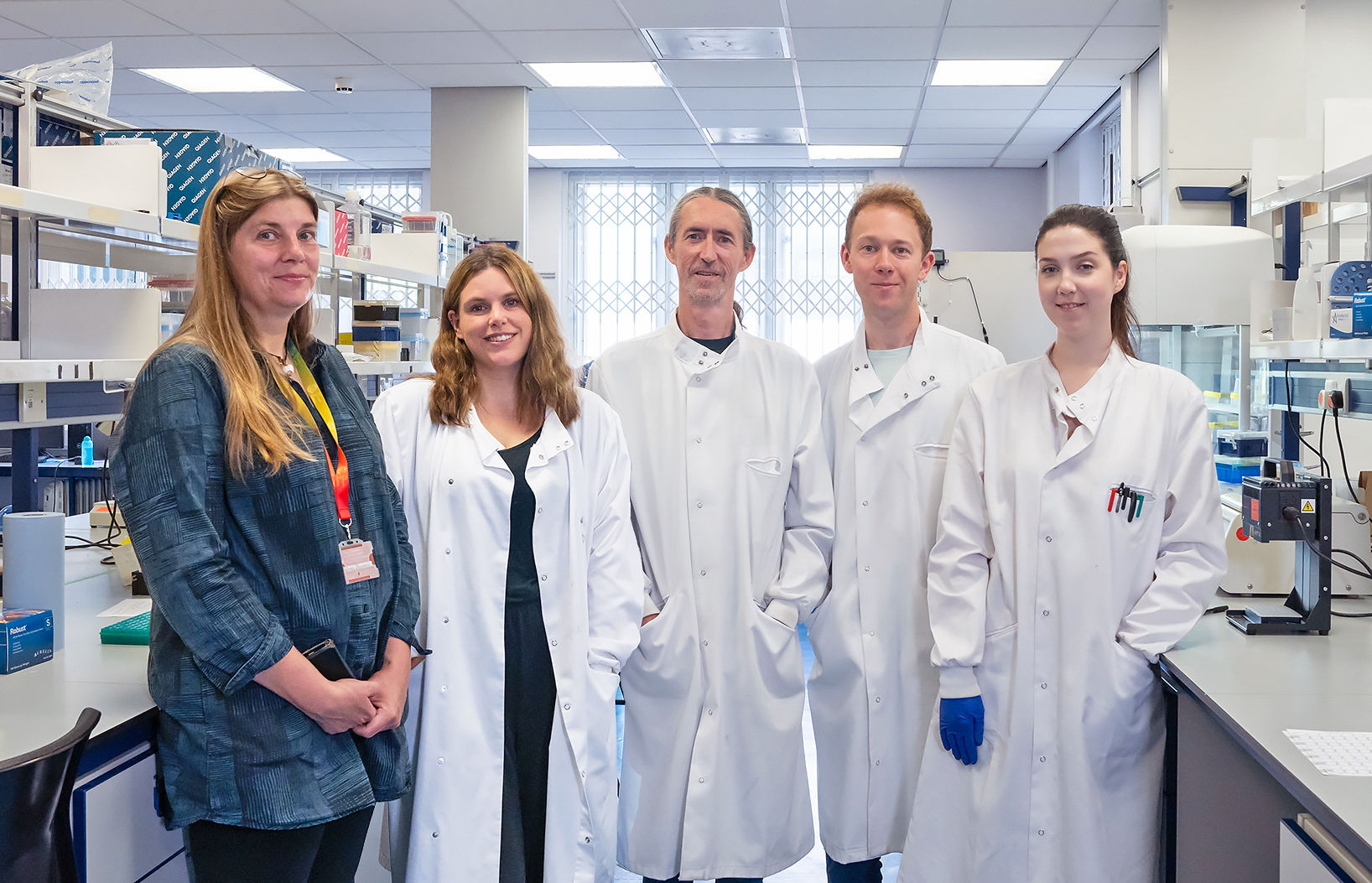
NEOF-VF team from left to right: VF-manager Deborah Dawson, Rachel Tucker, Gavin Horsburgh, Tom Holden and Lucy Knowles
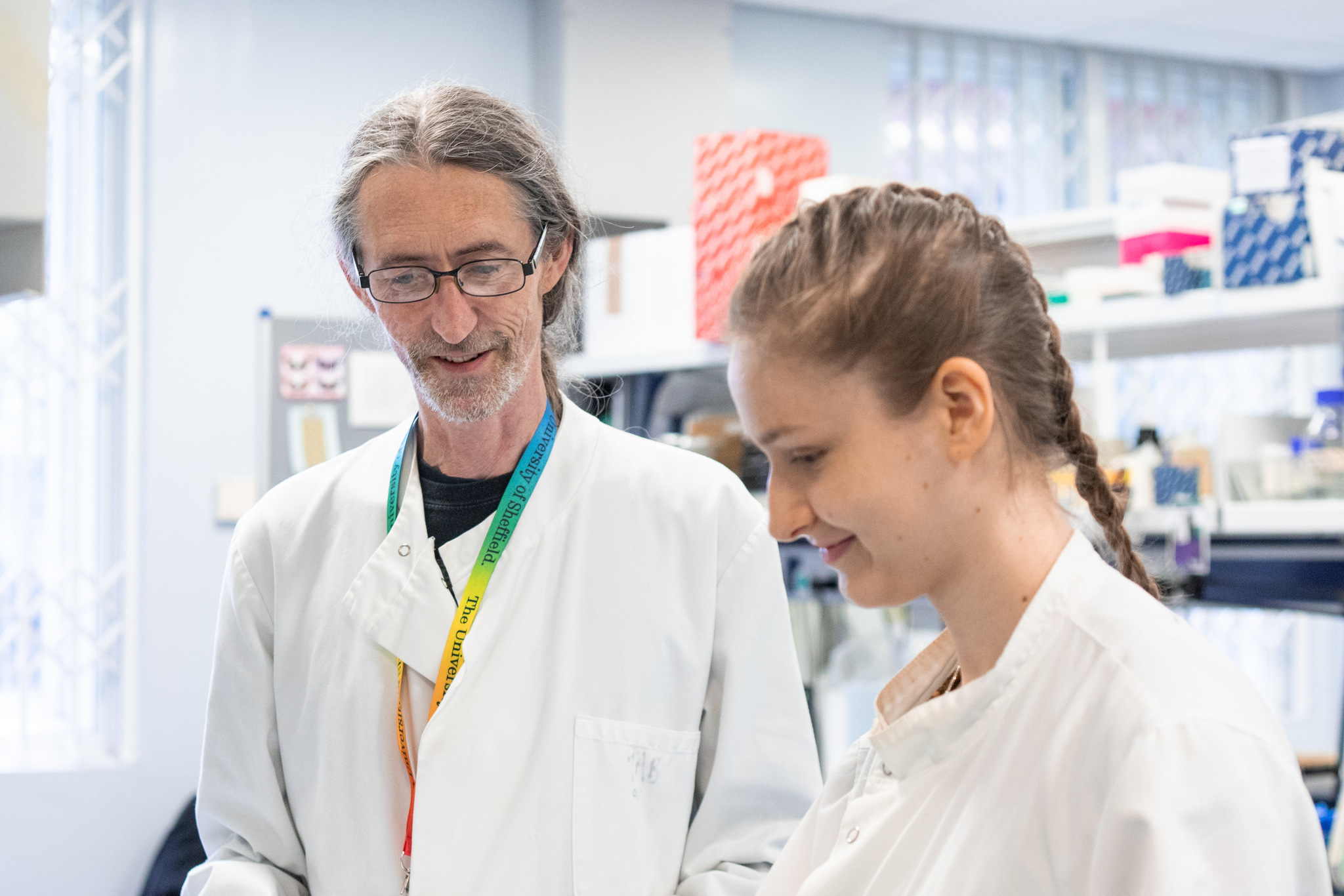
Visitor Facility
We provide year-round bespoke training to researchers who undertake the laboratory and/or analytical components of their project under our supervision at our Visitor Facility (NEOF-VF) located in the Genomics Laboratory at the University of Sheffield.
We support PhD students, research fellows, PDRAs and research technicians, who are working within the NERC remit. We cannot support Masters or undergraduate students.
The Visitor Facility was first established in 1998, has regularly been updated since, and is extremely well equipped for all molecular population genetic and genomic applications. Visitors are supervised by the NEOF-VF team but also have the opportunity to participate in seminars and to interact with other members of the Ecology and Evolutionary Biology research cluster. Visits vary in length from days to months.
Access, including consumables, is free to successful applicants, but we do not support travel and accommodation costs. Users of the Visitor Facility also have free access to the new-generation DNA sequencing that their project requires. While the amount of sequencing is not unlimited, we aim to provide sufficient sequencing to enable users to produce a published output. Potential applicants should initiate a discussion about their proposed project via our enquiry form.
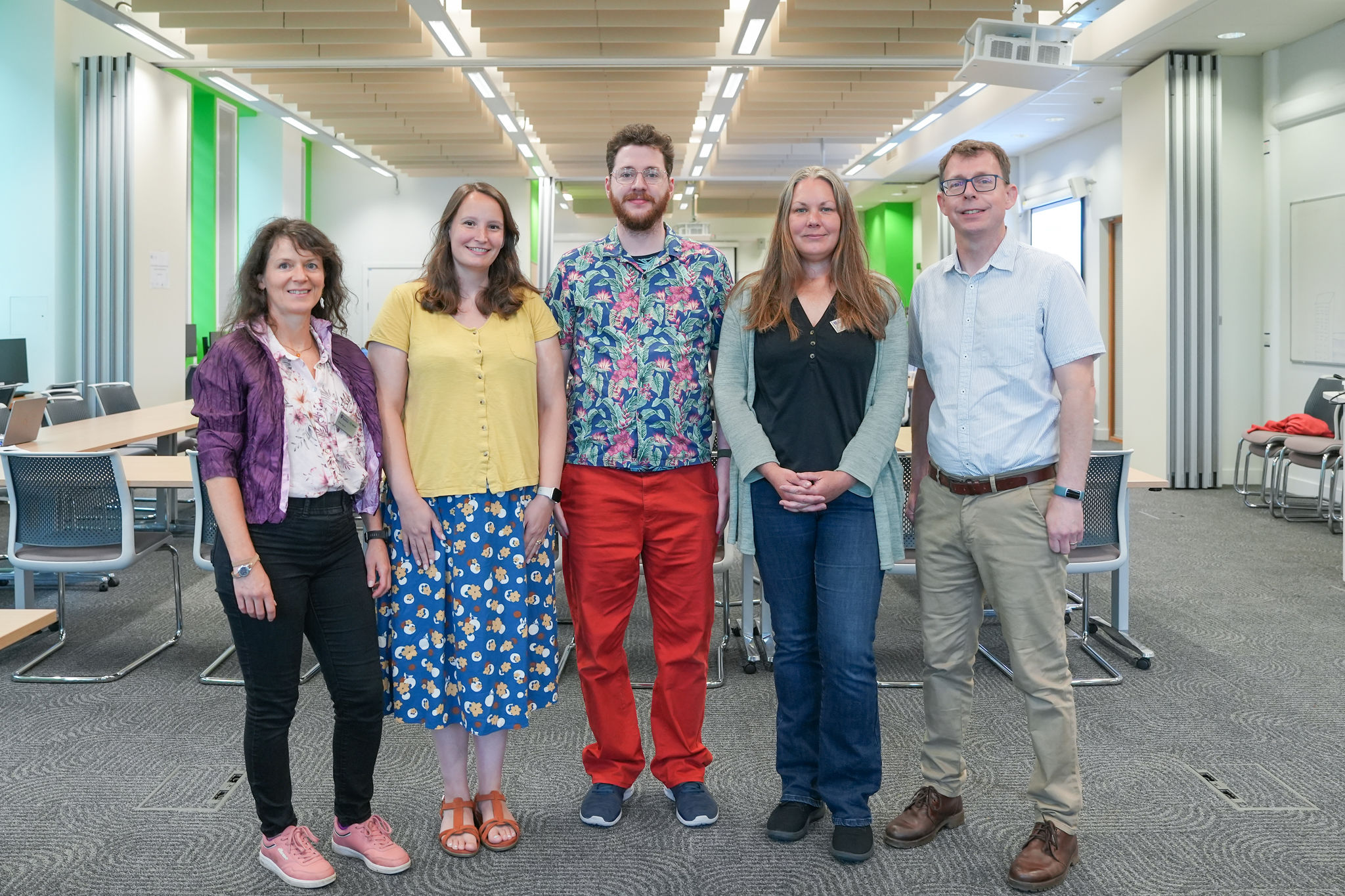
NEOF Training team from left to right: Céline Pagnier, Katy Maher, Matthew Gemmell, Helen Hipperson, Gavin Gouws.
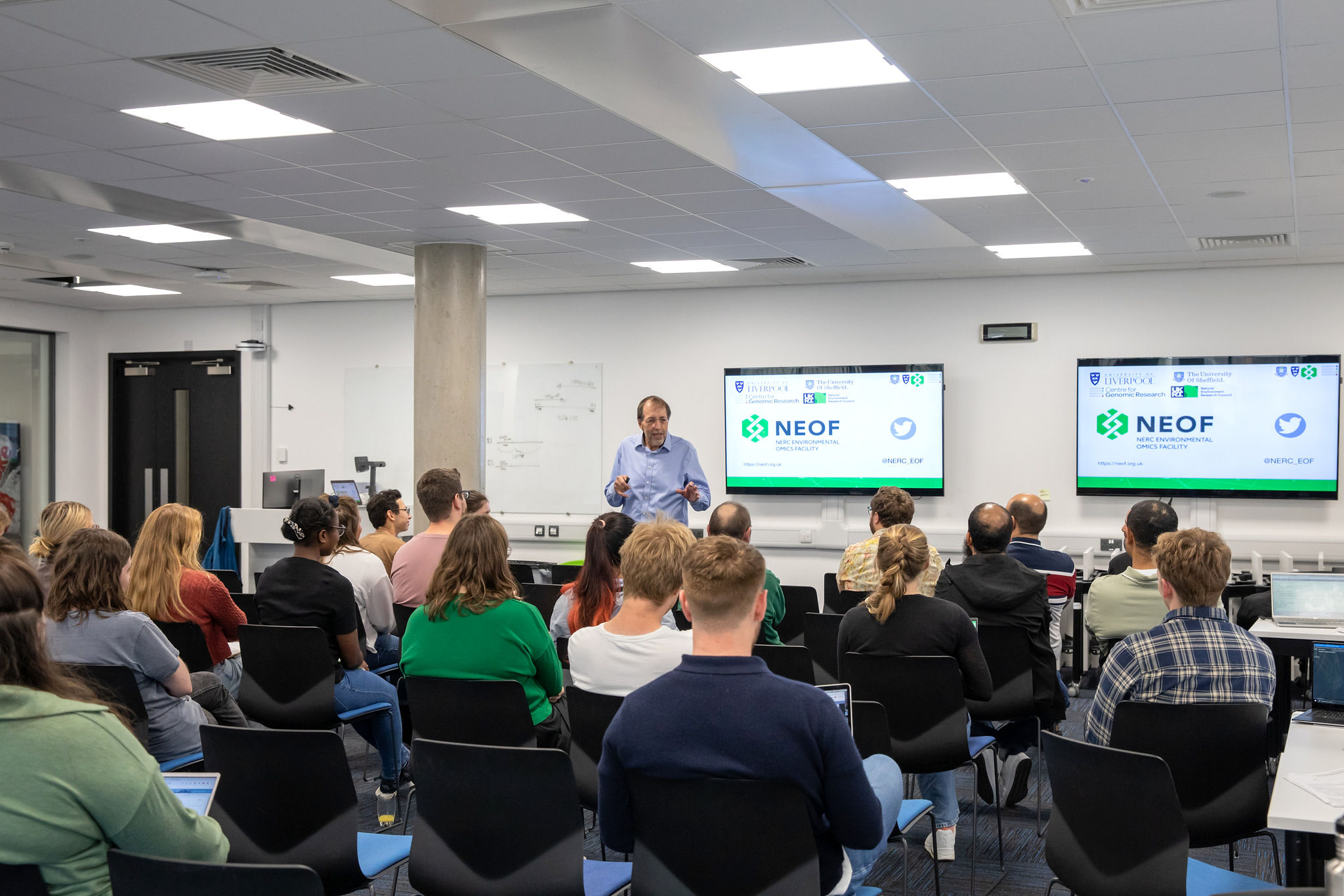

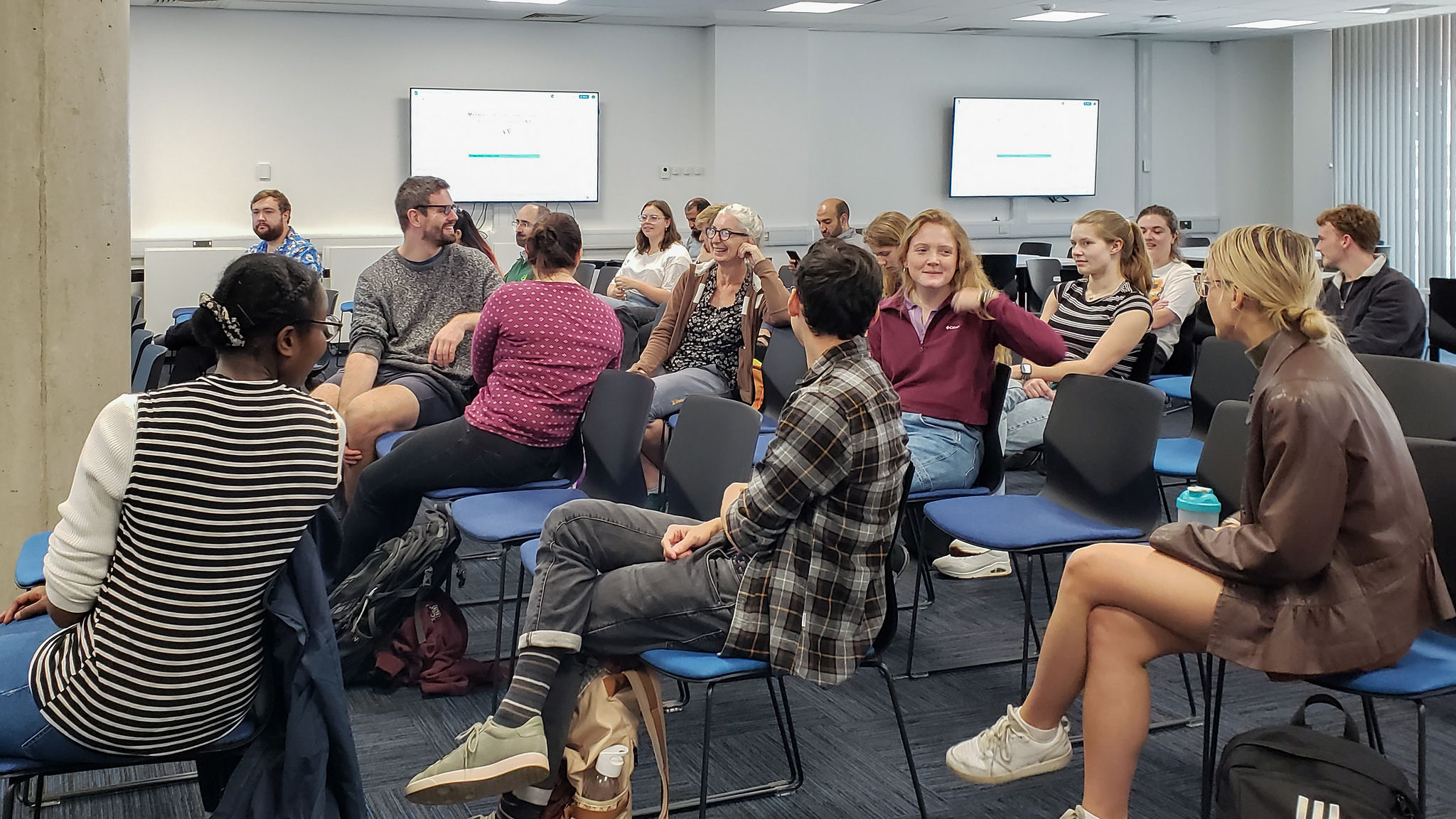
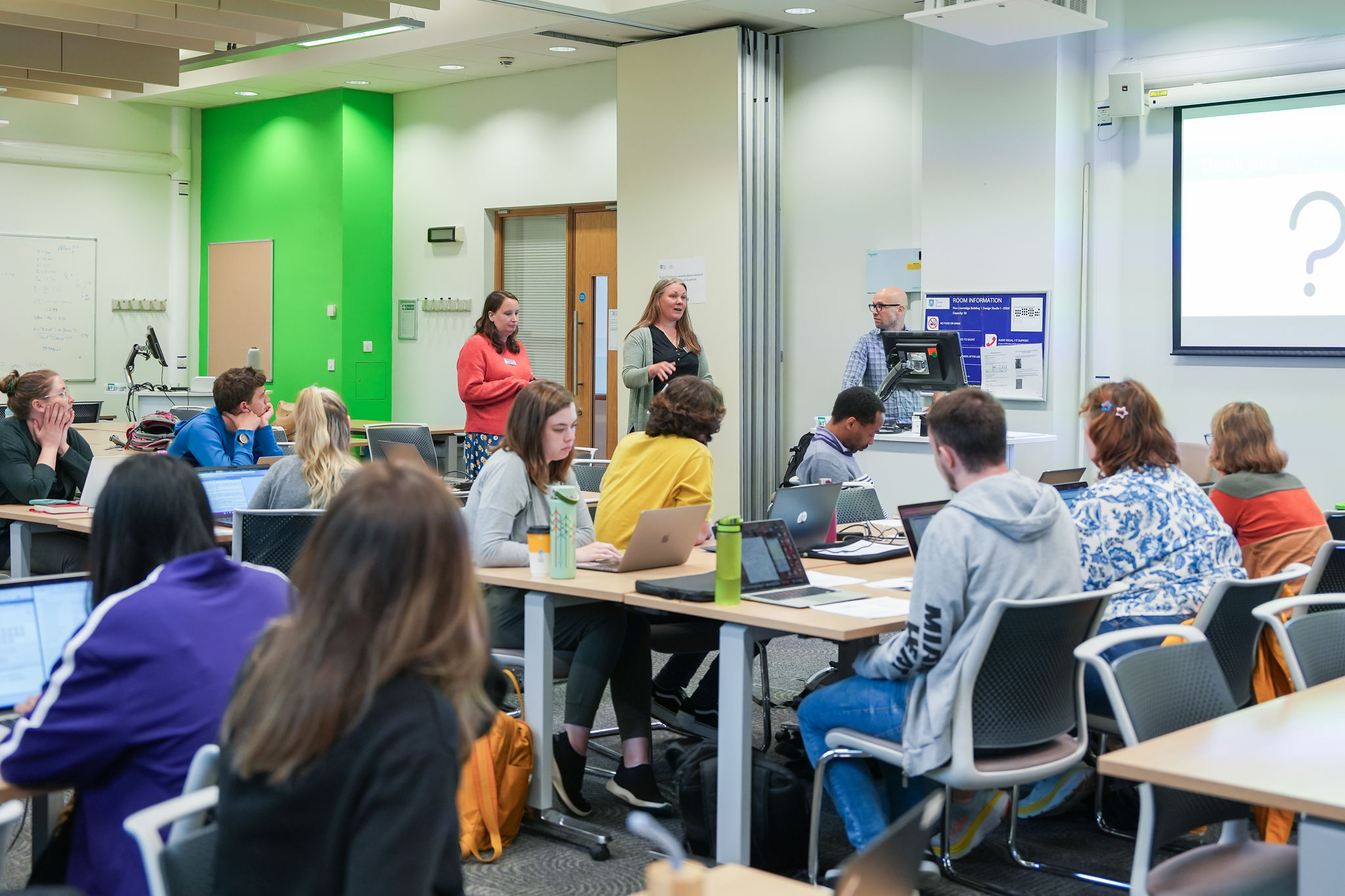
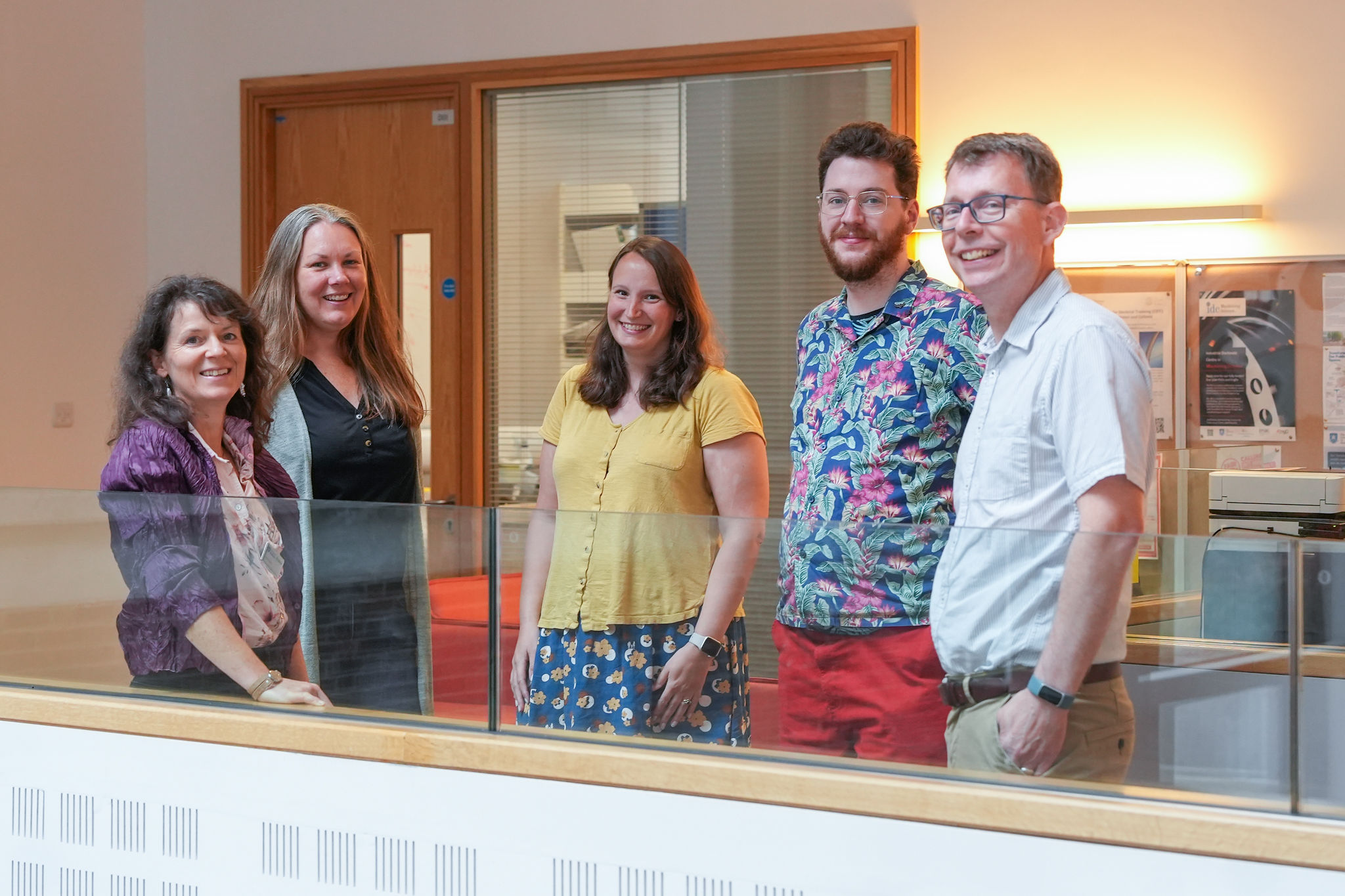
Bioinformatics courses
We provide training courses to support a range of capabilities including, for example, genome assembly, metabarcoding, population genomics and RNA sequencing. We aim to support the training that is in most demand from our community.
These are some of the training courses we are running online. Our plan is to deliver most these courses online until further notice, and we run two annual workshops in person.
Unless otherwise stated, registration closes on Monday at noon 2 weeks prior to the start of each course; selected attendees are then invited to confirm their place. If you have not heard from us then, please check your spam folder.
Invisible
Community analysis in R - 17 & 19 June 2025
Phylogenomics NOW ONLINE - 15 & 17 July 2025
With the proliferation of Next Generation Sequencing, data sets for the study of phylogenetic relationships are getting increasingly larger, and data sets of genome-wide markers from a multitude of taxa are now readily attainable to address questions around the evolution, biogeography and accurate delineation of biodiversity. The tools used to conduct typical phylogenetic analyses have advanced to accommodate these larger data sets, opposed to studies of single genes or a few data partitions or sequence alignments that were common a decade ago. In this workshop, we will use several example data sets and work through quality control of the data, prepare genome-wide SNP data for phylogenetic analysis, construct and evaluate phylogenetic trees, date phylogenies, and examine gene tree and species tree conflicts in delimiting species.
eDNA wetlab and bioinformatics IN PERSON Training - Mon 8 to Fri 12 September 2025
Generating DNA sequence barcodes from mixed sources of DNA is an increasingly-used and efficient way to survey biodiversity, whether monitoring aquatic species by sampling water-derived DNA, characterising communities from soil samples, or analysing diet from faecal-derived DNA. This course provides an overview of metabarcoding with different barcoding genes to target particular taxa, and consists of a technical wet lab component and a bioinformatics component. Interested delegates may apply to attend either or both workshops.
During the wet lab component, we will give an overview of experimental design, head outside for a field sampling demonstration and return to the laboratory for a full course on the metabarcoding process. The laboratory techniques will include DNA extraction, polymerase chain reaction (PCR), gel electrophoresis, magnetic bead cleaning and quantification. Finally, we will outline the different platforms that are typically used for sequencing.
In the bioinformatics component, we will use an example data set to go from raw sequence data through to assigning taxonomy to identified sequence variants. We will then conduct typical downstream analyses to quantify and examine differences in diversity.
Introduction to command line bioinformatics - Tue 7 October 2025
Bioinformatics is an increasingly important skill for biological scientists. Many bioinformatic tools can only be run on Unix based operating systems. This course is aimed at beginners and novices to the command line; it will give an overview of fundamental unix commands, directory navigation, and file manipulation. The course will act as a perfect primer for those interested in our other Bioinformatic courses.
Introduction to sequencing data and quality control - 28 & 30 October 2025
There are 3 sequencing technologies that are heavily used for biological research; Illumina, PacBio, and ONT. These three technologies each have their own errors and biases. At the end of this course you will understand these error profiles, and be able to use command line tools to measure sequencing quality and conduct quality control.
Register by Monday 13/10/25
R Primer for omics - 18 & 20 November 2025
R is a highly used programming language for visualisation of data and statistical analysis. There are many R packages for the analysis of biological datasets. This course is aimed at beginners and novices to R. It will give an in depth overview of the foundations of R and Rstudio plus introduce data sorting, visualisation and statistical analysis.
Register by Monday 3/11/25
Python for Bioinformatics - 9 & 11 December 2025
Python is one of the most popular programming languages for bioinformatics and data analysis in general. It is a very flexible language with countless applications in the manipulation and processing of data files. This course is aimed at Python beginners and will give you transferable skills to manipulate your own data and experience in Python modules tailored specifically for bioinformatics and genomics analyses.
Register by Monday 24/11/25
Bacterial 16S metabarcoding - 13 & 15 January 2026
Sequencing of the 16S rRNA gene is a well established method of determining the bacterial taxonomic composition of microbiomes. This has been used for human and animal body sites, soil, sewage, clouds, deserts, permafrost and many other environments. This course will give you the ability to describe the advantages and disadvantages of 16S rRNA sequencing, and analyse 16S rRNA datasets with the QIIME2 bioinformatics platform.
Register by Monday 15/12/25
Invisible
“The whole course was fascinating and so helpful. I was concerned about the programming at first, but the clarity of the workbook and clear explanations of the team were brilliant and gave me confidence. The team was patient and supportive. Brilliant” (May 2025)
“The pre-course material was really helpful and I felt equipped to then take on everything that the course covered. The books were very well explained, clearly laid out and easy to follow. I felt able to ask questions, and the team were really helpful. The whole thing was fantastic and I feel much more confident about going forward and carrying out my own analysis. Thank you so much!” (April 2025)
“The NEOF team is really good, webVNC support was excellent! Particularly helpful was the responses and extra resources shared through group messages and DMs on Slack! Looking forward to future courses.” (March 2025)
“The support received on this course was amazing. If I had any problems or queries, my questions were answered promptly and resolved quickly. The opportunity to learn the very basics of bioinformatics and then apply these commands during data manipulations was a highlight for me, having never done any bioinformatics work before. I am very thankful of NEOF and hope to take part in one of their courses again in the future.” (February 2025)
“I really enjoyed that the day started with a lecture on the background before commencing activities, which caught me up to speed with the wider context. The workbook was well thought through and can easily be applied to future scenarios. I thought the course was extremely valuable and would recommend it to others. The teaching was well led and the instructors were knowledgeable and easily approachable ” (Nov2023)
“I always like the way the instructors are open to answer every questions even if they don’t have a clear answer, they search the proper papers or info related” (Nov2023)
“The workshop went really well – much better than I thought! I thought I would be stuck at some part of a code and wouldn’t get help on time. However, this never happened. Instructors were always there, ready to help albeit everything was run online. It’s great that you could see our command line so you could provide immediate help. Thanks a lot!”
“I am very thankful to the instructors as this is the first time I have been able to complete AND UNDERSTAND a bioinformatics workshop. The topics covered in this workshop will be very useful and the format allowed me to work at my own pace without worrying that I’m falling behind. I will be signing up to more workshops!”
“I thoroughly enjoyed this course and it will be directly useful for my own (NERC funded) PhD research. Matthew’s description of the concepts were very clear, and the course leaders also answered all questions very clearly (and they were lovely!). The online format worked smoothly and felt like I was there in person. I look forward to future courses!”
Invisible
WORKSHOPS WE HAVE PREVIOUSLY RUN
Invisible
Introduction to command line bioinformatics - (Feb 2021, Oct 2021, Oct 2022, Oct 2023)
Bioinformatics is an increasingly important skill for biological scientists. Many bioinformatic tools can only be run on Unix based operating systems. This course is aimed at beginners and novices to the command line; it will give an overview of fundamental unix commands, directory navigation, and file manipulation. The course will act as a perfect primer for those interested in our other Bioinformatic courses.
Introduction to sequencing data and quality control (March 2021, Nov 2021, Nov 2022, Nov 2023, Oct 2024)
There are 3 sequencing technologies that are heavily used for biological research; Illumina, PacBio, and ONT. These three technologies each have their own errors and biases. At the end of this course you will understand these error profiles, and be able to use command line tools to measure sequencing quality and conduct quality control.
”Really enjoyed the MCQs to check knowledge particularly when looking at plots that would be easy to glance at without understanding” (Feedback November 2023)
Bacterial 16S metabarcoding (April 2021, Feb 2022, Feb 2023, Jan 2024, Feb 2025)
Sequencing of the 16S rRNA gene is a well established method of determining the bacterial taxonomic composition of microbiomes. This has been used for human and animal body sites, soil, sewage, clouds, deserts, permafrost and many other environments. This course will give you the ability to describe the advantages and disadvantages of 16S rRNA sequencing, and analyse 16S rRNA datasets with the QIIME2 bioinformatics platform.
Metabarcoding for diet analysis and environmental DNA (May 2021, Mar 2022, Sep 2022, Feb 2023, May 2025)
Sequencing DNA barcodes from mixed sources of DNA is an increasingly used way to survey biodiversity, whether analysing dietary content from faecal-derived DNA or monitoring aquatic species from water-derived DNA. This course will give an overview of metabarcoding with different barcoding genes to target particular taxa. Using an example data set we will go from raw sequence data through to assigning taxonomy to the sequence variants.
Metabarcoding and data sharing for eDNA - CEH EBI & NEOF (March 2024)
Sequencing DNA barcodes from mixed sources of DNA is an increasingly used way to survey biodiversity, whether analysing dietary content from faecal-derived DNA or monitoring aquatic species from water-derived DNA. This course gave an overview of metabarcoding with different barcoding genes to target particular taxa. Using an example data set we went from raw sequence data through to assigning taxonomy to the sequence variants.
The course also described the process of sharing, finding, and using publicly available data.
Metabarcoding and environmental DNA wetlab and bioinformatics - in person workshop, University of Sheffield (Sep 2023, July 2024)
Generating DNA sequence barcodes from mixed sources of DNA is an increasingly-used and efficient way to survey biodiversity, whether monitoring aquatic species by sampling water-derived DNA, characterising communities from soil samples, or analysing diet from faecal-derived DNA. This course provides an overview of metabarcoding with different barcoding genes to target particular taxa, and consists of a technical wet lab component and a bioinformatics component.
During the wet lab program, we gave an overview of experimental design, headed outside for a field sampling demonstration and returned to the laboratory for a full course on the metabarcoding process. The laboratory techniques included DNA extraction, polymerase chain reaction (PCR), gel electrophoresis, magnetic bead cleaning and quantification. Finally, we outlined the different platforms that are typically used for sequencing.
In the bioinformatics component, we used an example data set to go from raw sequence data through to assigning taxonomy to identified sequence variants. We then conducted typical downstream analyses to quantify and examine differences in diversity.
The workshop was held over two half days and three full days.
Microbial shotgun metagenomics (June 2021, April 2022, March 2023, March 2024, April 2025)
There are many unknown and unculturable microbes found in a vast array of different environments. Shotgun metagenomics is an approach to capture all the genetic information in a sample, providing the taxonomic and metabolic information of all present organisms. In this course we will analyse shotgun metagenomic sequencing data from stool samples to compare western and Korean diets. At the end of the course you will be able to quantify the taxonomic composition with Kraken2 & Bracken, and determine the metabolic profile with the bioBakery suite of tools.
Population genomics (July 2021, Jan 2022, Jan 2023, July 2023, May 2024, Mar 2025)
This course will introduce participants to a variety of population genomics analyses for large next generation sequencing (NGS) datasets. It will include discussion on single nucleotide polymorphism (SNP) calling and filtering options, an introduction to population genomics statistics, examining genetic structure, and Fst-based analyses such as outlier detection/genomic islands of divergence.
Phylogenomics (Jan 2024, November 2024)
With the proliferation of Next Generation Sequencing, data sets for the study of phylogenetic relationships are getting increasingly larger, and data sets of genome-wide markers from a multitude of taxa are now readily attainable to address questions around the evolution, biogeography and accurate delineation of biodiversity. The tools used to conduct typical phylogenetic analyses have advanced to accommodate these larger data sets, opposed to studies of single genes or a few data partitions or sequence alignments that were common a decade ago. In this workshop, we will use several example data sets and work through quality control of the data, prepare genome-wide SNP data for phylogenetic analysis, construct and evaluate phylogenetic trees, date phylogenies, and examine gene tree and species tree conflicts in delimiting species.
Bacterial genome assembly and annotation (August 2021, June 2022)
With the advent and improvement of long read sequencing technologies, bacterial genome assembly and annotation is easier and more effective than ever. At the end of this course you will be able to perform genome assembly and polishing of PacBio sequencing followed by annotation with prokka. Additionally you will be able to assess the quality of the genome with contiguity measures from QUAST and genome completeness estimation with BUSCO.
RNA-seq gene expression and pathway analysis (September 2021, July 2022, June 2023, June 2024)
RNA-Seq (AKA whole transcriptomic shotgun sequencing) aims to determine the presence and quantity of RNA in a biological sample at a given moment in time. This allows you to determine the level of expression of these genes and therefore compare these expressions across different sample groups, i.e. Differential Gene Expression (DGE). At the end of this course you will be able to align the transcriptomes of samples to a reference genome to determine gene expression levels. Following this you will be able to carry out Differential Gene Expression analysis to determine which genes are up and down regulated between sample groups.
Introduction to R - (November 2021, May 2022); R Primer for omics (Nov22, Nov23, Dec24)
R is a highly used programming language for visualisation of data and statistical analysis. There are many R packages for the analysis of biological datasets. This course is aimed at beginners and novices to R. It will give an in depth overview of the foundations of R and Rstudio plus introduce data sorting, visualisation and statistical analysis.
Python for Bioinformatics (Dec 2022, Dec 2023, Jan 2025)
Python is one of the most popular programming languages for bioinformatics and data analysis in general. It is a very flexible language with countless applications in the manipulation and processing of data files. This course is aimed at Python beginners and will give you transferable skills to manipulate your own data and experience in Python modules tailored specifically for bioinformatics and genomics analyses.
Eukaryote genome assembly - (April 2023, June 2024)
Eukaryotic genomes can be large and complex and there have been many recent developments in the tools available for optimal genome assembly. This course will give an overview of long read genome assembly using PacBio HiFi sequencing and scaffolding using Hi-C reads. We will cover initial assessment of the sequencing data, genome assembly and scaffolding, determining the contiguity and completeness of the assembly and also explore visualisation tools.
Community analysis in R (May 2023, Apr 2024, Sep 2024)
A lot of different analysis and visualisations can be carried out with community data. This includes taxonomy and functional abundance tables from 16S rRNA and Shotgun metagenomics analysis. This workshop will introduce you to the phyloseq R object; a specialised object containing an abundance, taxonomy, and metadata table. You will learn how to import your data into a phyloseq object, analyse your data and produce bespoke visualisations in R with the packages qiime2R, phyloseq, and microbiome.
CONTACT US
Empowering the next generation of environmental researchers.
If you would like more information about NEOF and the services we offer, or make any other enquiry, please complete our form.
